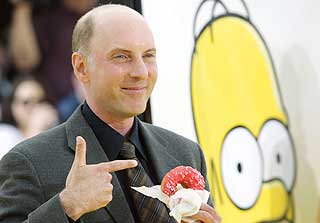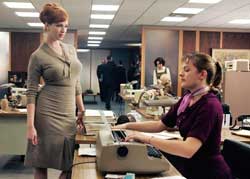Here's
the A.V. Club on the best TV series of the past decade. I have a few quibbles, but all in all, a pretty good list, and a decent argument that it's been a good time for TV.
Here they are, with some quick comments.
1. The Wire (Heard a lot of great things about it, but haven't checked it out yet)
2. The Sopranos (About as great as TV gets)
3. Arrested Development (A fine sitcom that never caught on--maybe ranked a bit high?)
4. Freaks And Geeks (Never got around to watching it, which is odd since I've met Paul Feig a few times and he grew up in Detroit like me--maybe I'll do a marathon some weekend)
5. Mad Men (Really good show, but it's not even halfway over)
6. Breaking Bad (If anything, better than Mad Men)
7. The Office--U.K. (Fine, but tough to watch)
8. Lost (Maybe my favorite show of all)
9. Deadwood (Watched a couple times, never got into it--same for Oz, Carnival, Rome, Band Of Brothers and other premium fare)
10. The Shield (Never watched it--I'll check it out after The Wire)
11. The Office--U.S. (Good, though they've stretched it, and Michael Scott is still too annoying)
12. Battlestar Galactica (Started great, faltered aong the way)
13. 30 Rock (Fun, but not quite classic)
14. Futurama (Clever, but no Simpsons or Family Guy--speaking of which, where's that?)
15. Veronica Mars (Heard good things, never saw it)
16. Friday Night Lights (Never got into it, but did get tired of hearing how great it was)
17. Firefly (Saw the movie, never saw the show)
18. How I Met Your Mother (Seen a few episodes. Reasonably well done, but I'm not into it, whereas I liked Big Bang Theory right away.)
19. Big Love (Didn't get into it)
20. Tim And Eric Awesome Show, Great Job! (Haven't watched it)
21. Curb Your Enthusiasm (Best non-animated comedy of last decade?)
22. Six Feet Under (Watched a few episodes. Seemed sort of dull.)
23. Undeclared (Wanted to watch it but didn't. Maybe I'll do a marathon one night.)
24. Dexter (Watched a few minutes. Didn't seem for me.)
25. Buffy The Vampre Slayer (Have some friends who are devoted to it. Haven't seen it, though I did see the movie.)
26. The Venture Bros. (Never watched it--where's Robot Chicken?)
27. Flight Of The Conchords (A bit too spare and deadpan, but I watched 'em all, so it must have something)
28. Eastbound & Down (Didn't like it at all)
29. Wonder Showzen (Never seen it)
30. The West Wing (Impressive in many ways, though I wonder if it would hold up. By the way, the list also gives examples of essential episodes, and mentions 'The Two Cathedrals," which I thought was excruciatingly bad.)
Note of all these shows, only six could (very charitably) be considered prime time network hits. And none of them except maybe Lost were ever considered blockbusters. (What's a true blockbuster? CSI, Desperate Housewives, American Idol.)
Anyway, if it hadn't happened already, this was the decade the action on TV moved to cable. HBO alone is responsible for 8 of the shows on this list.





















